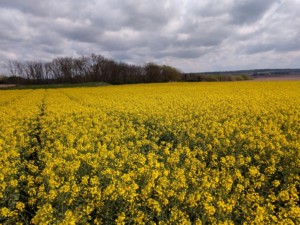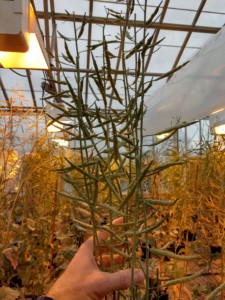 By Mike Stamm
By Mike Stamm
Developing and evaluating high-yielding and regionally adapted winter canola cultivars, improving canola cropping systems, and delivering new technologies and practices to growers are priorities of the project “Development and Management of Canola in the Great Plains Region” supported by the U.S. Department of Agriculture’s National Institute of Food and Agriculture (NIFA). It includes researchers in Kansas, Oklahoma, Texas, Colorado, Nebraska and New Mexico.
NIFA funds support canola breeding objectives at Kansas State University (KSU). ‘KS4719’ winter canola was released by KSU in 2020 and will be licensed to WinField United as the conventional cultivar ‘CP1066WC.’ This cultivar possesses exceptional winter hardiness, improved lodging tolerance and slightly better shatter tolerance than previous KSU releases.

Seed increase of ‘KS4719’ canola variety in bloom near Manhattan, Kansas
Cultivars with a KSU genetic component have been planted on an average of 37,000 acres over the past five years.
Another development from the NIFA project is the testing of female parent lines in testcross hybrid combinations. These lines are the first hybrid parents bred specifically for Great Plains climatic conditions. The release of new hybrid parent lines is expected in two to three years.
Several research studies are delivering results that will impact how producers can successfully grow winter canola in the region and nationally. KSU researchers compiled a winter survival dataset from the National Winter Canola Variety Trial from 2003 to 2018 (190 site-years) and gathered auxiliary weather data over the last 40 years. An analysis of this information indicated environmental variables related to minimum temperature, fluctuating temperatures above and below freezing, and wind chill during the winter were the main factors accounting for winter kill in the crop. These results will help determine whether or not winter survival will be a limiting factor for production.

Testcross hybrid made in a KSU greenhouse. Seed from these crosses were planted in a field for testing in fall 2021.
Oklahoma State University (OSU) evaluated the effect of maintaining standard management practices on canola quality and yield when stands are thinned by winter kill. When standard management was maintained, no differences were observed between three (optimal), one and 0.75 plants per square foot. When density decreased to 0.50 plants per square foot, yields decreased by 27 percent. This shows that when winter survival is below optimal, canola can compensate for stand losses as long as standard inputs are maintained.
Several studies are assessing the application of crop inputs under low and high management schemes. KSU compared low-input management to high, where applying all inputs increased yield by 196 percent over zero inputs. On average, high-input treatments increased yield by 146 percent over low-input. Eliminating a spring nitrogen application had the greatest negative impact on yield. New Mexico State University showed a split application of nitrogen in the spring improved productivity and nitrogen use efficiency compared to applying all nitrogen in the fall. In addition, OSU demonstrated a three-way split of 60 pounds of nitrogen per acre did not differ from a two-way split application of 90 pounds per acre. These results indicate that spring nitrogen is a critical management practice, but splitting applications may allow for the use of lower rates.
The majority of the outreach activities for the Great Plains project were held virtually because of the COVID-19 pandemic. This enabled researchers to reach local, national and international audiences through multiple platforms to share their most recent research results.
Mike Stamm, M.S., is a canola breeder at Kansas State University in Manhattan.